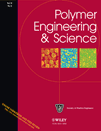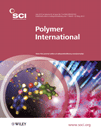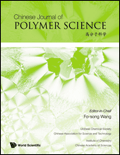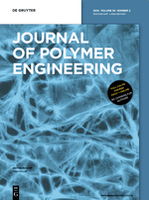
POLYMER JOURNAL
Scope & Guideline
Exploring the Dynamics of Polymers and Plastics
Introduction
Aims and Scopes
- Polymer Synthesis and Characterization:
The journal publishes studies on various polymerization techniques, including radical, anionic, and cationic polymerizations, as well as innovative methods for synthesizing and characterizing new polymeric materials. - Biopolymer Applications:
Research on biopolymers is a core focus, highlighting their use in drug delivery systems, tissue engineering, and sustainable materials, particularly in the context of medical and environmental applications. - Nanocomposite Development:
The journal covers the creation and application of polymer nanocomposites that incorporate nanoparticles to enhance mechanical, thermal, and electrical properties, addressing industrial and technological challenges. - Smart and Responsive Materials:
A significant area of research includes the development of smart materials that respond to environmental stimuli such as temperature, pH, and light, with applications in sensors, actuators, and drug delivery. - Sustainability and Green Chemistry:
The journal encourages research that promotes sustainability, including the use of bio-based feedstocks and environmentally friendly synthesis methods, as well as the recycling and reusability of polymers.
Trending and Emerging
- Biodegradable and Bio-Based Polymers:
There is a significant increase in research focused on biodegradable and bio-based polymers, driven by environmental concerns and the need for sustainable materials in various applications. - Smart Polymers and Hydrogels:
Emerging interest in smart polymers, particularly hydrogels that respond to stimuli such as temperature and pH, reflects advancements in drug delivery systems and biomedical applications. - Nanotechnology in Polymer Science:
The integration of nanotechnology into polymer research is trending, with a focus on nanocomposites that enhance the properties of traditional polymers for a range of applications, including electronics and energy storage. - Polymer-Based Drug Delivery Systems:
The development of advanced polymer-based drug delivery systems, particularly those that are responsive to environmental triggers, is gaining traction, highlighting the intersection of polymer science and medicine. - Recyclable and Reprocessable Polymers:
Research on recyclable and reprocessable polymers is on the rise, aiming to address plastic waste and promote circular economy practices within the materials science community.
Declining or Waning
- Traditional Polymerization Techniques:
Research focused solely on conventional polymer synthesis methods has decreased as newer, more efficient techniques such as RAFT and ATRP gain popularity, indicating a shift towards more advanced methodologies. - Standardization in Polymer Testing:
There is a noted decrease in papers dedicated to the standardization of testing methods for polymers, as researchers are increasingly exploring innovative applications rather than focusing on conventional testing protocols. - Basic Polymer Science Studies:
While foundational studies remain important, there has been a decrease in publications that do not directly link polymer science to practical applications, as the field shifts towards applied research with immediate relevance. - Single-Function Polymers:
The interest in polymers designed for single applications is waning, with a growing preference for multifunctional materials that can serve multiple purposes in various applications. - Non-biodegradable Polymer Studies:
As sustainability becomes a greater concern, research on non-biodegradable polymers has decreased, reflecting a shift towards biodegradable and environmentally friendly materials.
Similar Journals

Polymer Reviews
Unveiling the complexities of polymer technology.Polymer Reviews, published by Taylor & Francis Inc, is an esteemed journal dedicated to the intricate and evolving field of polymer science. With its ISSN 1558-3724 and E-ISSN 1558-3716, the journal has established a significant presence among researchers and practitioners alike, evidenced by its impressive categorization in the Q1 quartiles across multiple disciplines, including Biomedical Engineering, Materials Chemistry, and Renewable Energy. Since its inception in 2006 and continuing through 2024, Polymer Reviews has consistently aimed to advance the knowledge base of polymer applications and innovations, providing a platform for comprehensive review articles that stimulate further research and inspire practical solutions. The journal, ranking within the top percentile across several Scopus categories, underscores its impact and relevance in a rapidly developing scientific landscape. Though not an open-access journal, it remains a vital resource for those invested in the future of materials science and engineering.

JOURNAL OF POLYMER SCIENCE
Exploring the Science of Polymers: Where Innovation Meets ApplicationJOURNAL OF POLYMER SCIENCE, published by WILEY, is a premier, open-access journal dedicated to advancing the field of polymer science and its applications. With an ISSN of 2642-4150, it offers a platform for high-quality research and innovative ideas, contributing significantly to the understanding of polymaterials and their functionalities. The journal is recognized for its exceptional impact within various categories, consistently achieving Q1 rankings in Materials Chemistry, Physical and Theoretical Chemistry, and Polymers and Plastics, demonstrating its influential presence in the academic community. As of 2023, it holds a distinguished position in Scopus rankings, underscoring its relevance and rigorous peer-review process. By facilitating open access to vital research findings, the JOURNAL OF POLYMER SCIENCE plays a crucial role in fostering collaboration and knowledge transfer among researchers, professionals, and students, paving the way for innovative developments in polymer applications and materials science.

POLYMER ENGINEERING AND SCIENCE
Advancing the Frontiers of Polymer KnowledgePOLYMER ENGINEERING AND SCIENCE, published by WILEY, is a premier journal specializing in the field of polymer science and engineering. Since its inception in 1961, this journal has been at the forefront of disseminating high-quality research, focusing on various aspects of polymers and plastics, including their chemistry, properties, and applications. With an impressive impact factor, it ranks in the second quartile (Q2) across multiple categories, including Chemistry (Miscellaneous), Materials Chemistry, and Polymers and Plastics, showcasing the journal's significance and influence in these vital areas of research. Researchers and professionals in academia and industry will find the latest advancements and innovative methodologies in polymer science, making this journal an essential resource for those looking to stay updated on cutting-edge developments. While it does not currently support Open Access, its comprehensive scope and critical insights positioned it as a valuable platform for advancing knowledge and fostering collaboration within the polymer community. The journal’s office is located at 111 River St, Hoboken 07030-5774, NJ, United States, emphasizing its strong presence in the academic landscape.

MACROMOLECULAR CHEMISTRY AND PHYSICS
Navigating the Intersection of Chemistry and PhysicsMACROMOLECULAR CHEMISTRY AND PHYSICS, published by WILEY-V C H VERLAG GMBH, is a prominent journal dedicated to advancing the fields of condensed matter physics, materials chemistry, organic chemistry, physical and theoretical chemistry, and polymers and plastics. With an impressive H-index and a Q2 ranking in various relevant categories for 2023, this journal serves as a crucial platform for researchers and professionals to publish their innovative findings and theoretical advancements from 1994 to 2024. The journal's commitment to high-quality research is reflected in its Scopus rankings, which highlight its significant impact within the scientific community. Although it does not currently offer open access, it remains an essential resource for those seeking to explore the intricacies of macromolecular science. With a growing global audience, MACROMOLECULAR CHEMISTRY AND PHYSICS continues to shape the future of materials and polymer research, making it a must-read for students, researchers, and industry professionals alike.

JOURNAL OF POLYMER RESEARCH
Pioneering Insights into Polymer Science and TechnologyJOURNAL OF POLYMER RESEARCH is a leading peer-reviewed journal published by SPRINGER, specializing in the dynamic fields of polymer science, materials chemistry, and organic chemistry. Operating since 1994, this esteemed journal has consistently delivered high-quality research articles that illuminate the latest advancements and innovations in polymer technology. With an increasing impact factor and placed in the Q2 category for both Materials Chemistry and Polymers and Plastics, it stands as a valuable resource for researchers, professionals, and students seeking cutting-edge knowledge in these areas. The journal is indexed in Scopus, highlighting its significance in the academic community, with notable rankings in Materials Science and Organic Chemistry. While it does not currently offer open access options, the meticulous selection of research and thorough peer-review process ensures each article's contribution to the field is both robust and impactful. Researchers aiming to expand their understanding and engage with pioneering studies will find JOURNAL OF POLYMER RESEARCH an indispensable platform.

POLYMER SCIENCE SERIES B
Unveiling Cutting-Edge Discoveries in Polymer SciencePOLYMER SCIENCE SERIES B is a distinguished journal published by MAIK NAUKA/INTERPERIODICA/SPRINGER, dedicated to advancing knowledge in the fields of ceramics and composites, materials chemistry, and polymers and plastics. The journal, identifiable by its ISSN 1560-0904 and E-ISSN 1555-6123, spans a significant timeline from 1996 to 2024, reflecting its commitment to preserving and disseminating cutting-edge research in polymer science. With its current ranking in the Q3 category across relevant fields, it supports scholars and professionals in enhancing their understanding and application of polymeric materials. While it operates on a non-open access basis, the journal is pivotal for researchers seeking in-depth analysis and peer-reviewed studies. Located in the heart of the United States at 233 Spring St, New York, NY 10013-1578, POLYMER SCIENCE SERIES B serves as an essential resource for committed researchers, professionals, and students aiming to push the boundaries of polymer science.

POLYMER INTERNATIONAL
Elevating Knowledge in the World of PolymersPOLYMER INTERNATIONAL is a leading journal in the field of polymer science, published by Wiley, one of the most esteemed scholarly publishers. With an ISSN of 0959-8103 and an E-ISSN of 1097-0126, this journal has been a pivotal platform for researchers since its inception in 1991, now extending its coverage until 2024. The journal boasts a commendable standing in various scientific domains, achieving a Q2 quartile ranking in Materials Chemistry, Organic Chemistry, and Polymers and Plastics as of 2023. Additionally, it holds impressive Scopus ranks, including Rank #47 in Organic Chemistry and Rank #40 in Polymers and Plastics, placing it within the top percentiles of its categories. Researchers, professionals, and students alike can benefit from its rich array of articles that contribute to the understanding and advancement of polymer technology and materials science. Although not an open access journal, POLYMER INTERNATIONAL remains crucial for disseminating high-quality research that drives innovation and development within the field.

MACROMOLECULAR RESEARCH
Empowering the Future of Macromolecular InnovationMACROMOLECULAR RESEARCH, published by the POLYMER SOC KOREA, is a premier journal dedicated to advancing the field of macromolecular science and polymer engineering. With its ISSN 1598-5032 and E-ISSN 2092-7673, this journal has emerged as a vital platform for researchers and professionals interested in the application and development of polymers across various domains. Based in South Korea and operating as an open-access resource since its inception in 2002, MACROMOLECULAR RESEARCH consistently ranks in the Q2 category across diverse fields such as Chemical Engineering, Materials Chemistry, and Organic Chemistry as per the latest 2023 metrics. Notably, it is recognized for its substantial contributions to polymery science, increasing its visibility and impact in global research. By providing a forum for original research articles, reviews, and innovative methodologies, this journal aims to foster collaboration and knowledge sharing among scientists, engineers, and students alike. Join a community that is at the forefront of polymer research by exploring the wealth of resources and cutting-edge studies featured in MACROMOLECULAR RESEARCH.

CHINESE JOURNAL OF POLYMER SCIENCE
Connecting Researchers to the World of Polymer ScienceThe CHINESE JOURNAL OF POLYMER SCIENCE, published by SPRINGER, stands as a premier periodical in the realm of polymer science, showcasing cutting-edge research and technological advancements since its inception in 1985. With an impressive impact factor reflecting its significance in the field, this journal is categorized in the top quartiles (Q1) of Chemical Engineering, Organic Chemistry, and Polymers and Plastics. It features a wide spectrum of innovative studies, thus serving as an essential resource for researchers, professionals, and students dedicated to understanding and advancing polymer-related technologies. The journal is indexed in Scopus, with notable rankings that highlight its influence in the disciplines of organic chemistry and materials science, making it a vital communication platform for authors around the globe aiming to disseminate impactful findings. Although not an open-access publication, the journal ensures robust accessibility through institutional subscriptions and partnerships, further emphasizing its commitment to the advancement of polymer science.

JOURNAL OF POLYMER ENGINEERING
Driving Technological Breakthroughs in Polymers.JOURNAL OF POLYMER ENGINEERING, published by Walter de Gruyter GmbH, stands as a pivotal platform in the field of polymer science and engineering. With an ISSN of 0334-6447 and an E-ISSN of 2191-0340, this journal has been a vital contributor to the academic landscape since its inception, spanning publications from 1981 to 2024. As a recognized entity in the realms of Chemical Engineering, Materials Chemistry, and Polymers and Plastics, it holds a respectable position in Q3 quartile rankings according to the latest assessments. The journal is positioned to promote the exchange of cutting-edge research findings, technological advancements, and critical reviews that address the complexities of polymer application and innovation. Researchers and professionals will find a wealth of information, from experimental methodologies to theoretical analyses, all designed to inspire and elevate the current understanding of polymer engineering. By fostering collaboration and dissemination of knowledge, the JOURNAL OF POLYMER ENGINEERING remains crucial for advancing research and education in its specialized domains.